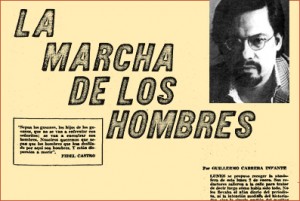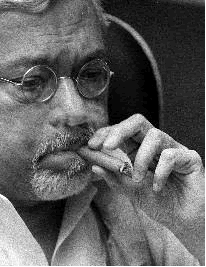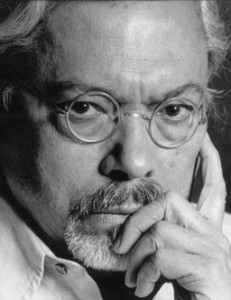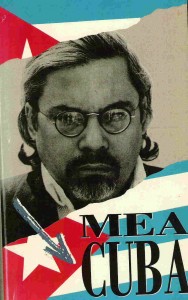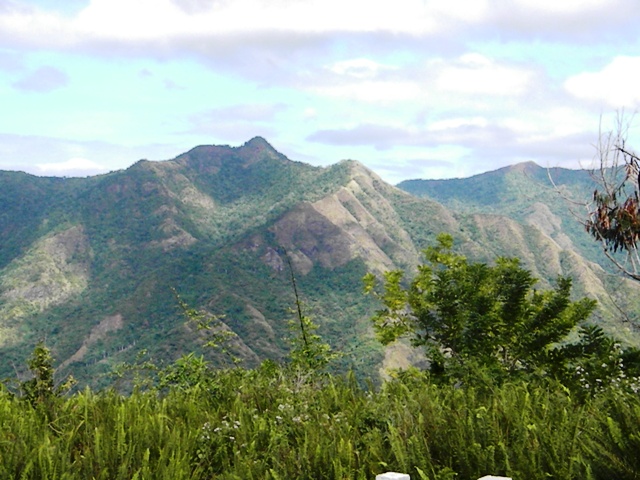![]() Guillermo Cabrera Infante, born April 22, 1929 and died February 21, 2005, was a Cuban novelist, essayist, translator, and critic; in the 1950s he used the pseudonym G. Caín.
Guillermo Cabrera Infante, born April 22, 1929 and died February 21, 2005, was a Cuban novelist, essayist, translator, and critic; in the 1950s he used the pseudonym G. Caín.
A one-time supporter of the Castro regime, Cabrera Infante went into exile to London in 1965. He is best known for the novel Tres Tristes Tigres (literally “three sad tigers”, but published in English as Three Trapped Tigers), which has been compared favorably to James Joyce’s Ulysses.
Born in Gibara in Cuba’s former Oriente Province (now part of Holguín Province), in 1941 he moved with his parents, to Havana, which would be the setting of nearly all of his writings other than his critical works. His parents were founding members of the Cuban Communist Party.
Originally he intended to become a physician, but abandoned that in favor of writing and his passion for the cinema. Starting in 1950, he studied journalism at he University of Havana. Under the Batista regime he was arrested and fined in 1952 for publishing a short story which included several English-language profanities. His opposition to Batista later cost him a short jail term.
He married for the first time in 1953. From 1954 to 1960 he wrote film reviews for the magazine Carteles, using the pseudonym G. Caín; he became its editor in chief, still pseudonymously, in 1957. With the triumph of the Cuban Revolution in 1959 he was named director of the Instituto del Cine. He was also head of the literary magazine Lunes de Revolución, a supplement to the Communist newspaper Revolución; however, this supplement was prohibited in 1961 by Fidel Castro.
He divorced in 1961 and in the same year married his second wife, Miriam Gomez, an actress. Having fallen somewhat out of favor with the Castro regime (the government’s ban on a documentary on Havana nightlife made by his brother led to his being forbidden to publish in Cuba), he served from 1962 to 1965 in Brussels, Belgium, as a cultural attaché. During this time, his sentiments turned against the Castro regime; after returning to Cuba for his mother’s funeral in 1965, he went into exile, first in Madrid, then in London.
In 1966 he published Tres Tristes Tigres, a highly experimental, Joycean novel, playful and rich in literary allusions, which intended to do for Cuban Spanish what Mark Twain had done for American English, recording the great variety of its colloquial variations.
It is little known that was the Guillermo Caín who co-wrote the script for the 1971 cult film Vanishing Point.
Although he is considered a part of the famed Latin American “Boom” generation of writers that includes his contemporary Gabriel García Márquez, he disdained the label. Always the iconoclast, he even rejected the label “novel” for his masterpieces, such as Tres Tristes Tigres and La Habana para un infante difunto. He was influential to Puerto Rican and Cuban writers such Luis Rafael Sánchez’s (La guaracha del Macho Camacho)and Fernando Velázquez Medina’s Ultima rumba en La Habana.
In 1997 he received the Premio Cervantes, presented to him by the King Juan Carlos of Spain.
He died on February 21, 2005, in London, of septicemia. He had two daughters by his first marriage.
Works
Así en la paz como en la guerra (1960, “In peace as in war”)
Twentieth Century Job (1963, film reviews)
Vista del amanecer en el trópico (1964, novel, published in English as “A View of Dawn in the Tropics”)
Tres Tristes Tigres (1967, novel, published in English as Three Trapped Tigers; the original title refers to a Spanish-language tongue-twister, and literally means “Three Sad Tigers”); portions of this were later republished as Ella cantaba boleros
Exorcismos de esti(l)o (1976, novel, “Exorcisms of style”; estilo means style and estío, summertime)
La Habana para un Infante Difunto (1979, memoir, published in English as Infante’s Inferno; the Spanish title is a pun on “Pavane pour une infante defunte”, title of a piano piece by Maurice Ravel)
Holy Smoke, 1985 (in English, later translated into Spanish as Puro Humo)
Delito por bailar el chachachá, 1995 (in English: Guilty of Dancing the ChaChaCha, 2001, translated by himself)
Cine o sardina (1997, “Cinema or sardine”)
Vidas para leerlas (1998, essays, “Lives to be read”)
Arcadia todas las noches (“Arcadia every night”)
Mea Cuba (1991, political essays, the title means “Cuba Pisses” or “Cuba is Pissing” and is a pun on “Mea Culpa”)
Infantería (title is a pun on his name and the Spanish for “infantry”)
Cabrera Infante also translated James Joyce’s Dubliners into Spanish (1972) and wrote screenplays, including Vanishing Point and the adaptation of Malcolm Lowry’s Under the Volcano.
Further reading
In English
Cabrera Infante’s Tres tristes tigres: the trapping effect of the signifier over subject and text / Hartman, Carmen Teresa., 2003
Guillermo Cabrera Infante: assays, essays and other arts / Nelson, Ardis L., 1999
Guillermo Cabrera Infante: two islands, many worlds / Souza, Raymond D., 1996
Guillermo Cabrera Infante and the cinema / Hall, Kenneth E., 1989
Novel lives: the fictional autobiographies of Guillermo Cabrera Infante and Mario Vargas Llosa / Feal, Rosemary Geisdorfer., 1986
Cabrera Infante in the Menippean tradition / Nelson, Ardis L., 1983
A critical study of Tres tristes tigres by Guillermo Cabrera Infante / C.A.H.J Scheybeler., 1977
Seven voices; seven Latin American writers talk to Rita Guibert. / Guibert, Rita., 1973
Acoso y ocaso de una ciudad : La Habana de Alejo Carpentier y Guillermo Cabrera Infante / Yolanda Izquierdo., 2002
Para leer Vista del amanecer en el trópico de Guillermo Cabrera Infante / Celina Manzoni., 1999
El heraldo de las malas noticias : Guillermo Cabrera Infante : ensayo a dos voces / Jacobo Machover., 1996
Cabrera Infante y otros escritores latinoamericanos / Ignacio Díaz Ruiz., 1992
Guillermo Cabrera Infante : La Habana, el lenguaje y la cinematografía / Ernesto Gil López., 1985
Discontinuidad y ruptura en Guillermo Cabrera Infante / Isabel Alvarez-Borland., 1982
Guillermo Cabrera Infante / Rosa María Pereda., 1979
Guillermo Cabrera Infante y Tres tristes tigres / Reynaldo L Jiménez., 1977
Guillermo Cabrera Infante / Julián Ríos., 1974
La nueva novela hispanoamericana y Tres tristes tigres / José Sánchez-Boudy., 1971
Agencies/Wiki/Escritores/Internet Photos/YouTube/ Arnoldo Varona/ TheCubanHistory.Com
THE CUBAN HISTORY, HOLLYWOOD.
![]() GUILLERMO CABRERA INFANTE, NOVELISTA, CRITICO
GUILLERMO CABRERA INFANTE, NOVELISTA, CRITICO
Guillermo Cabrera Infante nace en Gibara, provincia de Oriente, Cuba, el 22 de abril de 1929.
En 1941 sus padres emigran a La Habana.
Comienza a escribir en 1947, pero abandona sus estudios y una soñada carrera en medicina y empieza a trabajar en numerosos oficios o, como él mismo dijo, “en uno solo repetido”.
En 1949 crea el semanario Nueva Generación y en 1950 ingresa en la Escuela de Periodismo local en la que descubre la que va a ser, junto al cine, una de las pasiones de su vida.
En 1952 es detenido y multado a causa de la publicación de un cuento suyo, Bohemia, que contenía, según las autoridades cubanas, “insultos en ingles”. En esta época se revela como un acérrimo opositor al régimen dictatorial de Batista, postura que le llevará a la cárcel.
Se casa por primera vez en 1953 y, un año más tarde, comienza a escribir bajo el seudónimo de G. Caín la crítica de cine en “Carteles”, semanario popular del que llegaría a ser jefe de redacción el año 1957. Además de sus actividades periodísticas, continúa con la literatura de ficción y en los siguientes años gana premios y menciones con sus cuentos. Participa de manera muy activa en vida intelectual del país; funda la Cinemateca de Cuba, que presidirá de 1951 a 1956, y en 1959 es nombrado directivo del Instituto del Cine. Por otro lado, ocupará el cargo de director en el magazine literario “Lunes de Revolución” desde su fundación hasta la clausura de ésta en 1961. En 1960 publica su primer título importante “Así en la paz como en la guerra”.
A finales de 1961 se casa en segundas nupcias con la actriz Miriam. Al año siguiente viaja a Bélgica como agregado cultural. Esta salida de su país, del que no dejará de escribir a pesar de sus más de treinta años de exilio, modifica su postura respecto de la revolución cubana y pasará a convertirse en una de las voces críticas del régimen.
En 1967 publica “Tres Tristes Tigres”, la novela que le dará cierta notoriedad internacional. En ella hace una espléndida descripción de la noche, la cultura y el ambiente musical de La Habana con un lenguaje con el que no deja de experimentar y jugar. Crea un imaginario de la ciudad que marcará para siempre a la capital cubana en su imaginario literario:
“El gran descubrimiento de mi vida fue la ciudad de La Habana. No solamente descubrí la ciudad sino descubrí un cosmos, descubrí un hábitat y descubrí un mundo particular. Para mí eso fue decisivo…”, declaró.
En 1965 regresa a su adorada Cuba con motivo de asistir a los funerales de su madre y renuncia a la diplomacia exiliándose en Europa.
Su pasión literaria siempre corrió paralela a su otra pasión: el cine, por lo que en 1970, viaja a Hollywood para el rodaje de su guión de Banishing point. Desde entonces, realiza colaboraciones para el cine, entre ellas, el guión de Bajo el volcán de Joseph Losey. Colabora en las mejores publicaciones de Europa y América. De gran interés resulta la colección de artículos sobre cine, colaboraciones escritas entre 1954 y 1960, aparecidas bajo el título Un oficio del siglo XX en 1973, y el conjunto de ensayos sobre Orson Welles, Hitchcock, Hawks, John Huston y Vicent Minnelli, reunidos en Arcadia todas las noches en 1978.
Ha sido profesor en las universidades de Virginia y de West Virginia y conferenciante en otras universidades americanas, como la de Oklahoma. Es Doctor Honoris Causa por la Universidad Internacional de Florida y está en posesión de la medalla Sancho IV de la Universidad Complutense de Madrid.
Su amplia y diversa obra está marcada por este placer extremo por el juego con las palabras:
“Yo escribo autobiografías en forma de ficción, donde los elementos autobiográficos están tratados también como otros elementos de la ficción. Lo que me interesa realmente es lo que se pueda contar en términos de palabras intercambiables, palabras con las que se pueda jugar, palabras que puedan conducir a otro terreno que no sea el de la mera narración lineal.”
Guillermo Cabrera Infante ha residido los últimos cuarenta años de su vida, dedicado a la literatura y el periodismo, en Londres, ciudad en la que falleció el 21 de febrero 2005, a los 75 años.
(LEA MUCHOS DE LOS TRABAJOS DE GUILLERMO CABRERA INFANTE EN LA SECCION EN Ingles)
Agencies/Wiki/Escritores/Internet Photos/YouTube/Arnoldo Varona/ TheCubanHistory.Com
THE CUBAN HISTORY, HOLLYWOOD.




